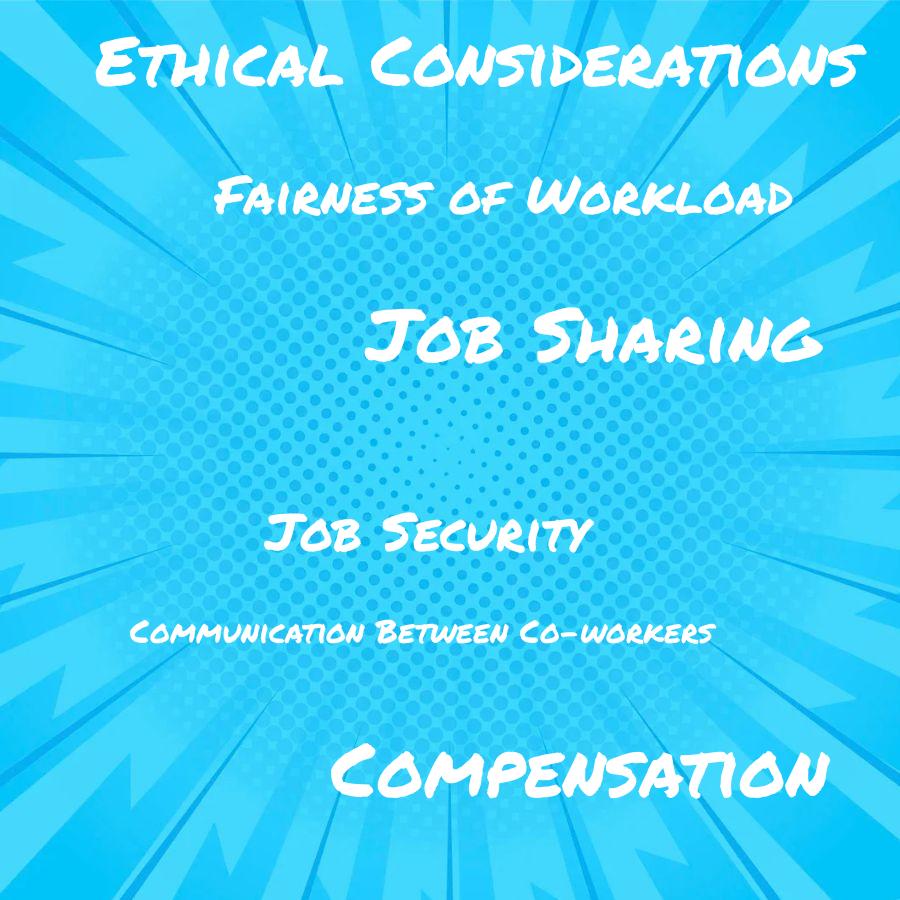Ethical considerations of job sharing include ensuring fair compensation, providing equal access to resources and opportunities, and respecting the privacy of both employees.
Job sharing is an increasingly popular workplace arrangement that allows two or more people to share the responsibilities of a single job. While job sharing has many potential benefits, such as increased flexibility and improved work-life balance, there are also ethical considerations that must be taken into account.
In this blog post, we will explore the ethical implications of job sharing and how employers can ensure fairness in their policies.
Fairness of Workload

It can be beneficial for both employers and employees, but there are ethical considerations that must be taken into account. One such consideration is fairness of workload.
This refers to ensuring that each job sharer has an equitable amount of work to do and receives equal pay for their efforts. It is important to ensure that the workload between job sharers is balanced so that neither person feels overburdened or underutilized.
It should be made clear from the outset how much each person will be paid for their contribution, as well as what benefits they will receive from the arrangement. By taking these steps, employers can ensure fairness of workload among job sharers and create an ethical working environment where everyone involved feels respected and valued.
Job Security
Job security refers to the assurance that a person will be able to keep their job for a certain period of time, regardless of any changes in the workplace or economy. When two people share one job, there is less certainty about how long each individual will remain employed.
This can lead to feelings of insecurity and anxiety among both employees, as they may worry that their position could be terminated at any time if the other employee decides to leave or if the company decides not to renew their contract. Job sharing can create competition between co-workers which can lead to tension and resentment in the workplace.
It is important for employers and employees alike to consider these potential issues when deciding whether or not job sharing is right for them.
Compensation
When it comes to compensation, ethical considerations must be taken into account. It is important that both employees receive fair and equal pay for their work, regardless of how much time each person spends on the job.
This means that employers should ensure that both employees are paid an equitable wage based on their experience, qualifications, and other factors such as seniority. Employers should consider any additional costs associated with having two people working part-time instead of one full-time employee (e.g., benefits).
Employers should also take into account any differences in workload between the two employees when determining compensation; if one employee is taking on more responsibility than the other then they should be compensated accordingly.
Communication Between Co-workers
It is essential that both parties involved in the job share have a clear understanding of their roles and responsibilities, as well as how they will communicate with each other. This includes setting expectations for communication frequency, methods (e.g., email, phone calls), and topics of discussion (e.g., progress updates).
It is important to establish ground rules for resolving any conflicts or disagreements that may arise during the course of the job share. Establishing these guidelines upfront can help ensure that both parties are on the same page and can work together effectively throughout their shared role.
Scheduling Conflicts
Job sharing is an arrangement in which two or more people share the responsibilities of one full-time job, usually working part-time hours. When two or more people are responsible for the same job, scheduling conflicts can arise due to different availability and preferences.
For example, if one person wants to work mornings and the other prefers afternoons, they may have difficulty finding a mutually agreeable schedule that works for both parties. If one person needs time off for personal reasons such as vacation or illness, it can be difficult to find someone else who is available and willing to cover their shift at short notice.
These types of scheduling conflicts can lead to frustration and resentment between co-workers if not managed properly by employers.
Potential for Conflict Between Co-workers
While this arrangement can be beneficial for both employers and employees, it also presents potential for conflict between co-workers. Conflict can arise when one worker feels that they are doing more work than their counterpart, or if there is disagreement over how to handle certain tasks.
Communication issues may arise due to different working styles or expectations of each individual involved in the job share. In order to prevent conflict from arising, it is important for employers and employees alike to have clear expectations about roles and responsibilities within the job share agreement.
This includes setting boundaries around who will do what tasks, as well as establishing a system of communication that works for everyone involved. It is also important to ensure that all parties feel respected and valued in their role within the job share agreement so that any disagreements can be addressed quickly and effectively before they become larger issues.
Related Reading
- What Are the Key Considerations for Employers When Implementing a Job Sharing Policy?
- What Are the Legal Considerations for Job Sharing?
- How Does Job Sharing Affect Salary and Compensation?
- What Are the Legal Considerations When Recruiting for Job Sharing Roles?
- What Are the Common Challenges of Job Sharing and How Can They Be Overcome?